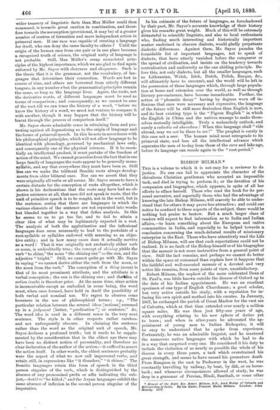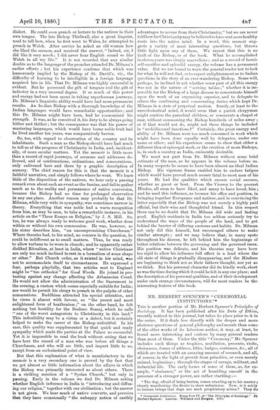BISHOP MILMAN.*
Tins is a volume to which it is not easy for a reviewer to do justice. No one can fail to appreciate the character of the chivalrous Christian gentleman who accepted an impossible task, and died in trying to perform it; or the devotion of his companion and biographer, which appears, in spite of all her efforts to efface herself. Those who read the book for its per- sonal narrative, and especially those who had the advantage of knowing the late Bishop Milman, will scarcely be able to under- stand that for others it may prove less attractive ; and could our notice be confined to these aspects of the subject, there would be nothing but praise to bestow. But a much larger class of readers will expect to find information as to India and Indian affairs,—to learn something about the European and native communities in India, and especially to be helped towards a conclusion concerning the much-debated results of missionary enterprise in the East. Those who have attentively read the Life of Bishop Milman, will see that such expectations could not be realised. It is no fault of the Bishop himself or of his biographer that the memoir is not more instructive from a general point of view. Still the fact remains, and perhaps we cannot do better within the space at command than explain how it happens that the faithful and well-executed memoir of a devoted and very active life remains, from some points of view, unsatisfactory.
Robert Milman, the nephew of the more celebrated Dean of St. Paul's, was little known outside the diocese of Oxford up to the date of his Indian appointment. He was an excellent specimen of one type of English Churchman; a good scholar, but very active outside his study, with a reputation for in- fusing his own spirit and method into his curates. In January, 1867, he exchanged the parish of Great Marlow for the vast see of Calcutta, which at that time extended over nearly a million square miles. He was then just fifty-one years of age, with everything relating to his new sphere of duties yet to learn ; and when in after-years he advocated the ap- pointment of young men to Indian Bishoprics, it will be easy to understand that he spoke from experience. Fortunately, he was an admirable linguist, and he mastered the numerous native languages with which he had to do in a way that surprised every one. He considered it his duty to include the visitation of as nearly as possible the whole of his diocese in every three years, a task which overstrained his great strength, and seems to have caused his premature death From Rangoon in the east to Peshawur in the west, he was constantly travelling by railway, by boat, by dak, or on horse- back ; and whenever circumstances allowed of study, he was deep in a grammar of Persian, Hindi, Santhali, or some other
Memoir of the Right Rev. Robert Milman, D.D., Lord Bishop of Calcutta and Metropolitan of India. By his Sister, Frances Maria Raman. London: Johlt Murray. 1879.
dialect. He could soon preach or lecture to the natives in their own tongue. The late Bishop Thirlwall, also a great linguist, used to tell how, when he first went to Wales, he attempted to preach in Welsh. After service he asked an old woman how she liked the sermon, and received the answer, "Indeed, sir, I did like it very much ; I did never hear English sound so like Welsh in all my life." It is not recorded that any similar doubts as to the language of the preacher attended Dr. Milman's earlier efforts ; but his experience confirms that which was humorously implied by the Bishop of St. David's, viz., the difficulty of learning to be intelligible in a foreign language acquired late in life. That Dr. Milman was highly successful is evident. But he possessed the gift of tongues and the gift of industry in a very unusual degree. If so much of this power and energy had not been spent in taking superhuman journeys, Dr. Milman's linguistic ability would have had more permanent results. An In dian Bishop with a thorough knowledge of the Indian languages would have remarkable opportunities ; and this Dr. Milman might have been, had he e conomised his strength. It was, as he conceived it, his duty to be always going hither and thither ; but the consequence was that his power of mastering languages, which would have borne noble fruit had he lived another ten years, was comparatively barren.
So, too, with regard to observation of the country and its inhabitants. Such a man as the Bishop should have had much to tell us of the progress Of Christianity in India, and, incident- ally, of more secular matters. Yet the memoir is little more than a record of rapid journeys, of sermons and addresses de- livered, and of confirmations, ordinations, and consecrations, only enlivened here and there by a graphic description of scenery. The chief reason for this is that the memoir is a faithful narrative, and simply follows where he went. We learn little of the disposition of the natives, we hear only a passing remark even about such an event as the famine, and fail to gather much as to the reality and permanence of native conversion, because the Bishop had no time for prolonged observation in any one place. Another reason may probably be that Dr. Milman, while very wide in sympathy, was sometimes narrow in theory. Everything that was noble had a warm recognition from him, as may be seen, to take a remarkable instance, in his article on the "Three Essays on Religion," by J. S. Mill. So, too, he was always ready to welcome good work, whether done within or without his own communion. He was, however, as his sister describes him, "an uncompromising Churchman." Where theories had, to his mind, no concern in the question, he could be indifferent as to small matters. Thus, he was ready to allow turbans to be worn in church ; and he apparently rather disliked Ritualism, at least in India, where 'native Christians are only too much inclined to rest in a formalism of some shape or other." But Church order, as it existed in his mind, was not to accommodate itself to circumstances. He expressed a fear, perhaps playfully, that two articles sent to England might be "too orthodox" for Good Words. He joined in pro- testing against any change affecting the Athanasian Creed. He would not allow the administration of the Sacrament in the evening, a custom which seems especially suitable for India; nor would he permit his clergy to preach in the pulpits of other communions. Buddhism attracted his special attention, and he views it almost with favour, as "the purest and most enlightened form of heathenism ;" on the other hand, he felt nothing but hostility for the Brahmo Somaj, which he calls
one of the worst antagonists to Christianity in this land." This inflexibility may be a. virtue or a defect, but it certainly helped to make the career of the Bishop unfruitful. In his case, this quality was supplemented by that quick and ready sympathy which made the parties at the Palace so successful. Yet it is impossible to read the book without seeing that we have here the record of a man who was before all things a Churchman, and who will see little, and impart little to us, except from an ecclesiastical point of view.
But that this explanation of what is unsatisfactory in the memoir is a very secondary one is proved by the fact that we get almost as little information about the affairs in which the Bishop was primarily interested as about others. There is a striking mention of a "Syrian Church," but only in passing. Early in the volume we find Dr. Milman asking whether English influence in India is "introducing and diffus- ing our religion," together with our civilisation ; but the answer is not given. We hear much of native converts, and perceive that they have occasionally "the unhappy notion of earthly advantages to accrue from their Christianity," but we are never told how far Christianity may be believed to have sent more healthy roots into the native mind. In a word, this memoir sug- gests a variety of most interesting questions, but throws little light upon any of them. We repeat that this is no fault of the Bishop, or of the book. What be accomplished in eleven years was simply marvellous ; and as a record of heroic self-sacrifice and splendid energy, the volume has a permanent value. But we are bound to warn the general reader not to look for what he will not find, or to expect enlightenment as to Indian questions in the story of an ever-wandering Bishop. Some will, perhaps, be inclined to ask whether some part of all this energy was not in the nature of "serving tables ;" whether it is im- possible for the Bishop of a large diocese to concentrate himself upon the work of an organising superior, and to delegate to others the confirming and consecrating duties which kept Dr. Milman in a state of perpetual motion. Surely, at least to the unecclesiastical mind, it would seem that a parish clergyman might confirm the parochial children, or consecrate a chapel of ease, without summoning the Bishop hundreds of miles away ; or if that would not do, might not these things be included in " archidiaconal functions ?" Certainly, the great energy and ability of Dr. Milman were too much consumed in work which might have been done equally well by delegates, under one name or other ; and his experience seems to show that either a different idea of episcopal work, or the creation of more Bishops,. is, in such a country as India, eminently desirable.
We must not part from Dr. Milman without some brief estimate of the man, as he appears in the volume before us Inmany respects he seems to have been almost an ideal Indian Bishop. His vigorous frame enabled him to endure fatigue which would have proved much sooner fatal to most men of his years. He had the qualities which ensure social success,. whether as guest or host. From the Viceroy to the poorest Hindoo, all seem to have liked, and many to have loved, him; and he used this influence, as became his office and position, in bringing together Europeans and natives, and in convincing the latter especially that the Bishop was not merely a highly paid official, but their wise and thoughtful friend. In this respect there can be no doubt that Dr. Milman did wide and lasting good. English residents in India too seldom seriously try to understand the ways of the people of the land, and to get behind the barrier of differing customs and habits. Dr. Milman not only did this himself, but encouraged others to make similar attempts ; and we may believe that; in many spots throughout his diocese, he left behind him the beginnings of better relations between the governing and the governed races. His position was delicate, and his theories may have been too rigid to allow his influence full effect in a land where the old state of things is gradually disappearing, and the Hindoos are beginning to think not as their fathers thought, nor yet as we think. But his personal character did its kindly work, short as was the time during which it could be felt in any one place; and the description of his personal qualities, and of their development under such strange circumstances, will for most readers be the interesting feature of this book.



































 Previous page
Previous page